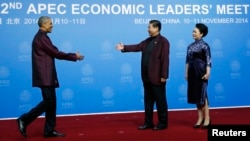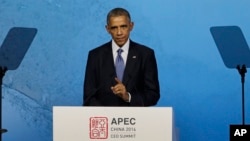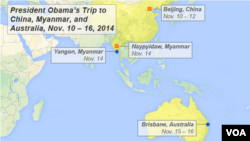President Barack Obama has received a warm welcome in China, despite tensions on issues like trade, human rights, and China’s territorial claims in the East and South China Seas.
Relations between the two countries have been strained, in large part, because of Chinese suspicions that the United States wants to contain China’s growth.
But both sides appeared wanting to accentuate the positive aspects of their relationship.
Chinese leaders welcomed Obama at Beijing airport Monday with an honor guard and red carpet.
Later, Obama addressed business leaders at the Asia Pacific Economic Cooperation summit. Dispelling Chinese suspicions topped his agenda.
“The United States welcomes the rise of a prosperous, peaceful, and stable China. I want to repeat that," the president said." We welcome the rise of a prosperous, peaceful and stable China. In fact, over recent decades, the United States has worked to help integrate China into the global economy. Not only because it’s in China’s best interests, but because it’s in America’s best interests and the world’s best interests. We want China to do well."
Deepening relations with China, Obama said, will mean more jobs and opportunity for the American and Chinese people. The U.S. leader announced a new agreement to extend the validity of visas for students, businesspeople and tourists.
“Under the current arrangement, visas between our two countries last for only one year. Under the new arrangement, student and exchange visas will be extended to five years. Business and tourist visas will be extended to 10 years,” said Obama.
Thorny issues
But the U.S. and China are far from agreeing on thorny issues like human rights, cyberspace, and trade.
Washington and Beijing are pursuing rival trade deals.
The APEC summit is a chance for Obama to rally Asia-Pacific nations to overcome obstacles to approve the long-delayed TransPacific Partnership trade agreement. The U.S. leader gathered heads of state of 11 countries at the American embassy in Beijing and urged them to get past what he said are remaining “logjams.”
On human rights, Obama refrained from condemning China for its behavior in Hong Kong, where demonstrators for months have accused Beijing of violating its commitment to not interfere in the autonomous region’s democratic process. The U.S. leader, however, said he remains concerned about what he described as a situation that is historically complicated.
Monday was the start of Obama’s three-day visit to Beijing for the APEC summit and meetings with Chinese President Xi Jinping. On Wednesday, he will travel to Myanmar, also known as Burma, before going to the G-20 summit in Australia.






